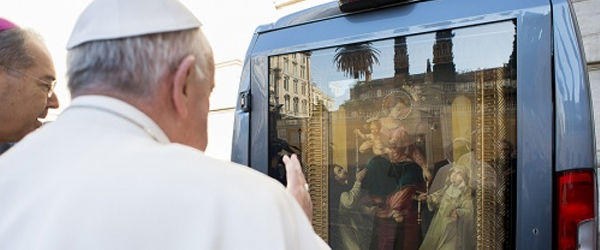A three-day conference on issues faced by Catholic advocates of comprehensive immigration reform is scheduled for Jan. 11-13 in Salt Lake City. The conference is sponsored by the U.S. Conference of Catholic Bishops and the Catholic Legal Immigration Network.
The conference's title, "Immigration --- A 50-State Issue: A Focus on State and Local Immigration Initiatives," reflects the USCCB's position that immigration is a federal issue, said Bishop John C. Wester of Salt Lake City.
He said the conference is a wonderful opportunity for the diocese. "Anytime anything of that size comes in here, it gives us a platform to once again speak of the important immigration issues to our people," he told the Intermountain Catholic, Salt Lake City's diocesan newspaper.
Bishop Wester added that immigration legislation created by state governments tends to create a harsh environment for undocumented people, and the conference can help advocates learn how to help these immigrants.
"On a broader scale, it allows us to be part of the solution that we hope will come about once the 2012 elections are over," he said.
Immigration must be dealt with on a federal level, said Kevin Appleby, USCCB director of migration policy. "If you have 50 different state policies and untold number of local policies on immigration, you're not going to have an effective system. Instead of putting energy into passing bills that are unconstitutional and build fear in communities, we should put energy into getting our federal delegation to do the right thing and reform the immigration system."
Archbishop José Gomez of Los Angeles, chairman of the USCCB Committee on Migration, will concelebrate the conference's opening Mass with Bishop Wester. Among the panelists will be John Sandweg, special counselor to Department of Homeland Security Secretary Janet Napolitano, and Marjean Perhot of Catholic Charities from the Archdiocese of Boston.
Instead of putting energy into passing bills that are unconstitutional and build fear in communities, we should put energy into getting our federal delegation to do the right thing and reform the immigration system.
The panelists were chosen because of their expertise on the particular issues facing Catholic advocates and others they partner with across the country on these state and local issues, Appleby said.
Attending the conference will be Catholic diocesan staff, state conference directors, attorneys of the Catholic Legal Immigration Network, priests and members of religious orders, Appleby said. "It's targeted toward the Catholic activist across the country."
Utah is an ideal spot for the conference, Appleby said. "I think the Utah Compact has caught the imagination of a lot of people."
The Utah Compact, which was signed in 2010, calls for a federal solution to immigration issues. Other points in the compact are for local law enforcement to not focus on civil violations of the federal code, and to keep families together. The Utah Compact has been used as a template for immigration discussions in other states.
Bishop Wester was among the compact's original signers, who also included civic, religious, business and political leaders.
The bishop said he plans to share what local Catholics have done with the Utah Compact, as well as their efforts on local immigration legislation. He also hopes to learn what has been done successfully in other areas of the country, he said.
The issue of immigration is an opportunity to put into practice the Gospel message of welcoming the stranger in our midst, Bishop Wester said. "This is a real, hands-on, concrete example of living the Gospel, not just talking about it," he said.
The conference has several goals, Appleby said. "First of all we want to build some solidarity among activists across the country --- diocesan folks who are fighting these battles locally, so they can know that they're not in it by themselves. They can share best practices, ... recharge their batteries a bit through the support of their colleagues across the country, ask questions about issues that they don't understand. It's part education and part networking and part solidarity among Catholics across the country."
---CNS

